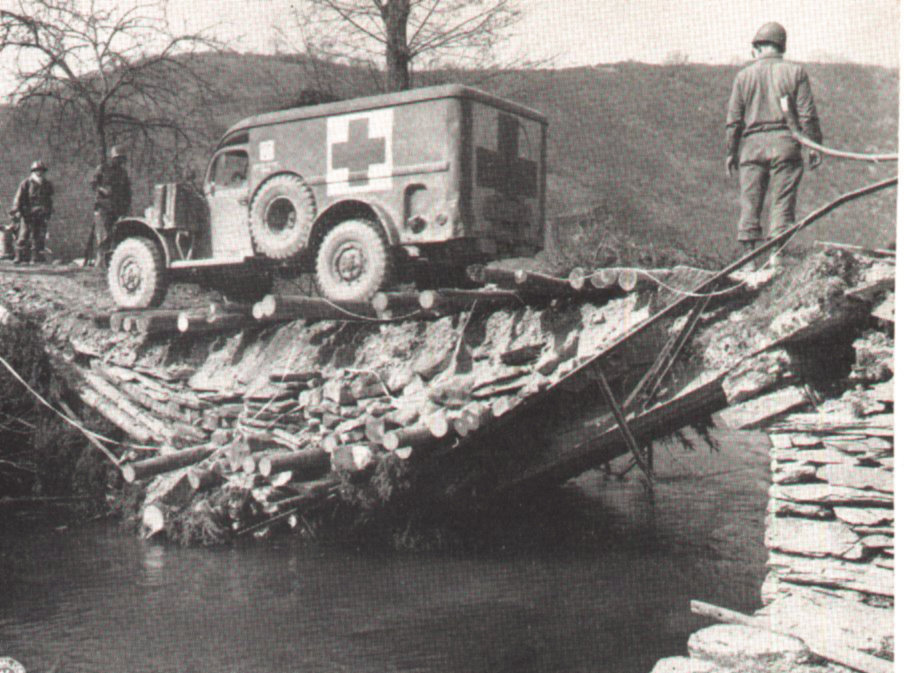
94th infantrymen improvise to get their ambulance across the Ruhr.
By Mary McTamaney
In my memory, I clearly see the old radio placed between the two front windows in the living room of 144 Johnston Street.
On June afternoons, my grandfather would sit in his wooden rocker close to the speaker to catch every play of his beloved Brooklyn Dodgers. But on the afternoon of June 6th, the Cashin family and all other Newburghers were sitting close to their radios or pacing about the doorways to their parlors straining to hear a far greater challenge than a baseball game. News was breaking about the invasion of Europe by Allied troops moving across the English Channel and onto the beaches of France to push back and defeat the armed forces of Nazi Germany.
The Cashins were listening because ten of their neighbors from just that one block between South and Farrington Streets were serving in the military. One of those young men was their next-door neighbor, Ben Reed, recently engaged to their daughter, Betty. So the radios were on all along Johnston Street that June and folks watched from their front stoops each evening for the arrival of the paperboys bringing the Newburgh News. Two doors down, at 138 Johnston, Blanche Kingsley listened and waited and prayed. She had three sons in the army, Robert, Lawlor and Albert. Mrs. Kingsley was widowed when her children were pre-schoolers and she raised those three boys and a baby daughter alone, moving in with an aunt in that tall Johnston Street row house.
Now her toddlers were grown and outfitted for war. Between the Cashins and the Kingsleys, Frank and Maggie Reed, my grandparents, listened for word of the invasion, wondering if their son, (later my father), was in that first wave. They knew he had made it to England and was involved in staging activities.
Blessedly, my dad didn’t have to run ashore through machine gun fire on June 6th. He wasn’t in the bloody Omaha Beach battle we know so well from the film, Saving Private Ryan. Dad waded ashore weeks later onto Utah Beach. Allied forces just kept coming after establishing that beachhead on June 6, 1944. Although eyewitnesses described the D-Day invasion as an uncountable mass of ships, men and materiel coming across the water from England, there was more being staged along the English coast and moving in as quickly as ships could be repaired and resupplied.
The 94th Infantry Division, including a young medic from Newburgh named Benjamin Reed, steamed over the channel and into Normandy when their turn came. The division first moved west along the French coast into the province of Brittany to take responsibility for containing over 60,000 German soldiers still besieged in their garrisons in the port cities of Lorient and Saint Nazaire. From there, the 94th (part of Patton’s 3rd Army) fought its way down through France and into the Saar-Moselle triangle and crossed into Germany. Dad’s medical company kept up with the wounded, walking and riding trucks along their way through the final seasons of World War II. They crossed the Rhine in March 1945 fighting their way through bloody battles in places like Lampaden and Ludwigshafen and assumed responsibility for destroying remaining German resistance between the Ruhr and the Rhine. As fighting subsided in late spring, the 101st Airborne Division relieved dad’s 94th Division and they moved on to establishing and maintaining a military occupation government for the remainder of 1945 in Czechoslovakia.
A quarter century later, in 1971, my parents came to visit my husband and me where we were living and working in Wurzburg, Germany. Things had certainly changed in the years since World War II ended. We took our vacation time and drove mom and dad around Germany for two weeks. That was the first time my father had ever discussed his war experiences with me and it was such a revelation. We traced some of his 1944-1945 footsteps. I heard about his rescues and his near misses. I saw places he had been billeted and let him tell me what it had looked and felt like a quarter century earlier.
When my husband and I moved back to Newburgh, dad gave me his 94th Infantry Division history book. I have read it more than once. Today, the names that I know from dad’s company history are scenic ports of call for the many river cruise lines that take visitors to experience old Europe. This year, when their commercials encourage us to see places “up close and personal,” let’s say a prayer for our ancestors who once saw those spots more closely and far more personally than tourists can ever imagine.